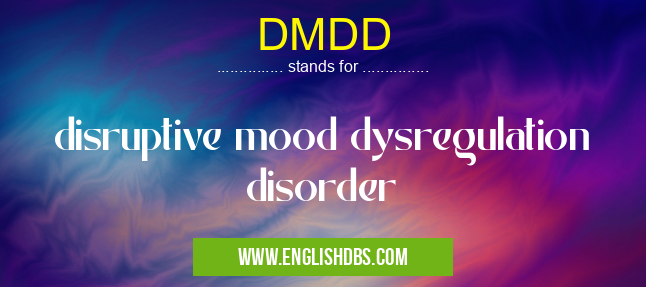What does DMDD mean in MEDICAL
Disruptive Mood Dysregulation Disorder (DMDD) is a mental health disorder in children ages 6 to 18. It is characterized by severe and persistent irritability, frequent intense outbursts and difficulty regulating emotions. DMDD has only recently been recognized as a separate diagnosis in the Diagnostic and Statistical Manual of Mental Disorders-5th edition (DSM-5). Symptoms of DMDD interfere with daily life, impacting school, family relationships and social situations. While there is no known cause of DMDD, research suggests it may be due to biological or environmental factors or both. Treatment may include psychotherapy, medications, family therapy and other interventions.

DMDD meaning in Medical in Medical
DMDD mostly used in an acronym Medical in Category Medical that means disruptive mood dysregulation disorder
Shorthand: DMDD,
Full Form: disruptive mood dysregulation disorder
For more information of "disruptive mood dysregulation disorder", see the section below.
What DMDD Means
Disruptive Mood Dysregulation Disorder (DMDD) is a mental health condition wherein individuals experience chronically irritable and angry moods along with intense temper outbursts beyond what would be expected for their age group. The DSM-5 defines this condition as having three criteria: frequent anger or irritability that occurs more days than not over the past year; recurrent temper outbursts that are verbal or behaviorally based; disproportionately intense reactions to situations compared to others in the same age group or developmental level. Individuals diagnosed with DMDD typically experience difficulty regulating emotions including feeling overwhelmed, quickly changing moods, an inability to empathize with others in difficult social situations, and low self-esteem resulting from being chastised for their outbursts.
Essential Questions and Answers on disruptive mood dysregulation disorder in "MEDICAL»MEDICAL"
What is Disruptive mood dysregulation disorder (DMDD)?
Disruptive mood dysregulation disorder (DMDD) is a mental health disorder typically diagnosed in children up to the age of 18. It often presents with severe and persistent irritability and frequent outbursts that are disproportionate to the situation.
What age group does DMDD typically affect?
DMDD typically affects children up to the age of 18 years old, though it can persist into adulthood.
What are some common symptoms associated with DMDD?
Common symptoms associated with DMDD include intense anger or irritability, frequent outbursts or tantrums, difficulty regulating emotions, difficulty getting along with others, and periodic depressive episodes.
What causes DMDD?
The cause of DMDD is not completely understood at this time but may be related to genetic predisposition, neurobiological factors, lifestyle choices, family dynamics, and environmental stressors.
How is DMDD diagnosed?
A diagnosis of DMDD is typically made by a mental health professional who will take into account a person’s medical history as well as conduct an evaluation to determine if they meet criteria for the diagnosis.
Is there a cure for DMDD?
Although there is no “cure” for DMDD per se, there are various treatments available which have been shown to reduce symptoms and improve quality of life. These treatments include cognitive behavioral therapy (CBT), medications, family therapy, social skill building interventions, lifestyle changes such as nutrition and exercise changes, relaxation techniques and other holistic approaches.
What should I do if my child has been diagnosed with DMDD?
If your child has been diagnosed with DMDD it’s important to seek help from a qualified mental health professional who specializes in treating this disorder. Treatment may involve individual or family based therapies as mentioned above; working closely with your healthcare provider can help ensure that your child has access to all the resources they need for successful management of their condition.
: Are there any long-term complications associated with untreated DMDD?
Yes – if left untreated over time individuals may experience difficulties such as poor academic performance or relationship challenges due to their inability to regulate their emotions or manage outbursts appropriately.
: Can adults be affected by DMDDE?
Although much less common than in children / adolescents, adults can also experience similar symptoms consistent with those seen in cases of disruptive mood dysregulation disorders; however additional evaluation by qualified professionals would be needed to make an accurate diagnosis.
: Is there a specific dietary plan that could help alleviate symptoms of disruptive mood dysregulation disorders (DMPD)?
There is no one size fits all approach when it comes diet plans for managing DMPD symptoms; however many individuals find it helpful focus on eating whole foods like fruits and vegetables while avoiding processed food items when possible as well reducing sugar intake.
Final Words:
Living with Disruptive Mood Dysregulation Disorder can create significant stress on an individual’s life as well as those around them who care for them. Early diagnosis is important so that individuals can receive appropriate treatment and interventions which may help the individual manage symptoms better over time thus creating better quality of life overall. Treatments vary depending upon the individual however comprehensive approaches usually consist of medication management, psychotherapy for symptom reduction such as Cognitive Behavioral Therapy (CBT), supportive counseling such as family therapy, skill building such as anger management classes and school consultations when needed.
